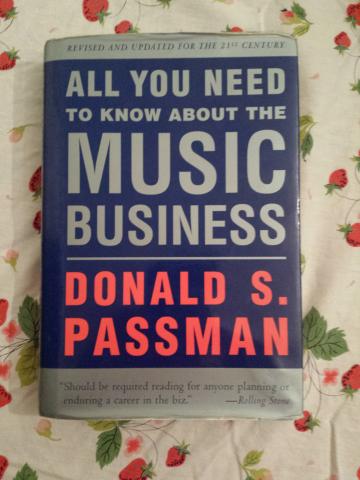Book Review: Donald S. Passman's "All You Need To Know About The Music Business"
Jan 10,2016
Everybody seems to be getting into music these days. With the proliferation of Youtube and other online resources, many teens and young adults who might otherwise never have an opportunity to learn an instrument are able to become prodigies or at least moderately competent in their chosen area of music. Some even have the chance to go full-time with their music, earning not only recognition but money also for their craft. Unfortunately, there are individuals in the music industry who would think nothing of taking advantage of aspiring musicians and fleecing them of their hard-earned cash. Or more commonly, there are simply people in the industry who are looking out for their self-interest and will thus do what they think is best for themselves. There is nothing wrong with this per se, but it is precisely why young musicians must assert their own interests and needs when conducting business. A huge part of business, of course, is knowing how it works, which is what industry insider Donald S. Passman reveals in All You Need To Know About The Music Business.
As Passman observes early on, musicians aren't exactly renowned for their business acumen. Indeed, a good number of them are liable to head for the door when the word comes up in conversation, delegating such responsibilities to their management. However, the reason this selection of musicians does so is because they can afford to, something that can't be said for the vast majority of people who are based in their parents' garage or stuck playing the same venues they were playing 5 years ago. For them, money is tight, so it is doubly important that they know what to expect when they finally strike it big.
Knowing that the immediate goals of anyone reading will vary, Passman wisely incorporates different "tracks" for readers depending on what they are trying to get out of the book. Ranging from "Extremely Fast Track" for those who just want to know how to put together an effective team of advisers and support staff for themselves to "Expert Track" for committed musicians who want to know what all goes into the various deals and arrangements they will have to make as professionals, the reader is able to move along at their own pace and determine what information they need to study on their own. The Expert Track, as you might have guessed, is the most thorough, entailing the entire text of the book and giving readers the most insight into "the biz".
Although Passman discusses a lot over the course of the book, he spends most of it talking about three areas: band advisory teams, record deals and songwriting and music publishing. We learn the difference between a personal manager and a business manager (hint: it has to do with how much money you make), how royalties work for songs you wrote in contrast to songs you record, and why you should never accept an offer from a distributor to offer "free goods" in the form of extra records of yours to customers. A good deal of time is spent describing copyright law, which is understandable given the multiple layers there are to publishing a song, and some mathematical operations are carried out to illustrate the more concrete points Passman tries to make about a particular practice. Fortunately, the math is very basic and the time spent on copyright is well-spent, as it makes readers aware that they are not the sole beneficiaries of songwriting and publishing deals.
The focus on business and law may cause many of the book's target audience to avert their eyes, but familiarizing themselves with the business aspect of the music business will only help them in the long run. Passman's ability to synthesize the two into an accessible account of what all goes into running a band or act is commendable, to say nothing of his willingness to use anecdotes from his own experience and time in the music industry to make points. If you're thinking about getting seriously involved with music, then you should check out All You Need To Know About The Music Business.






